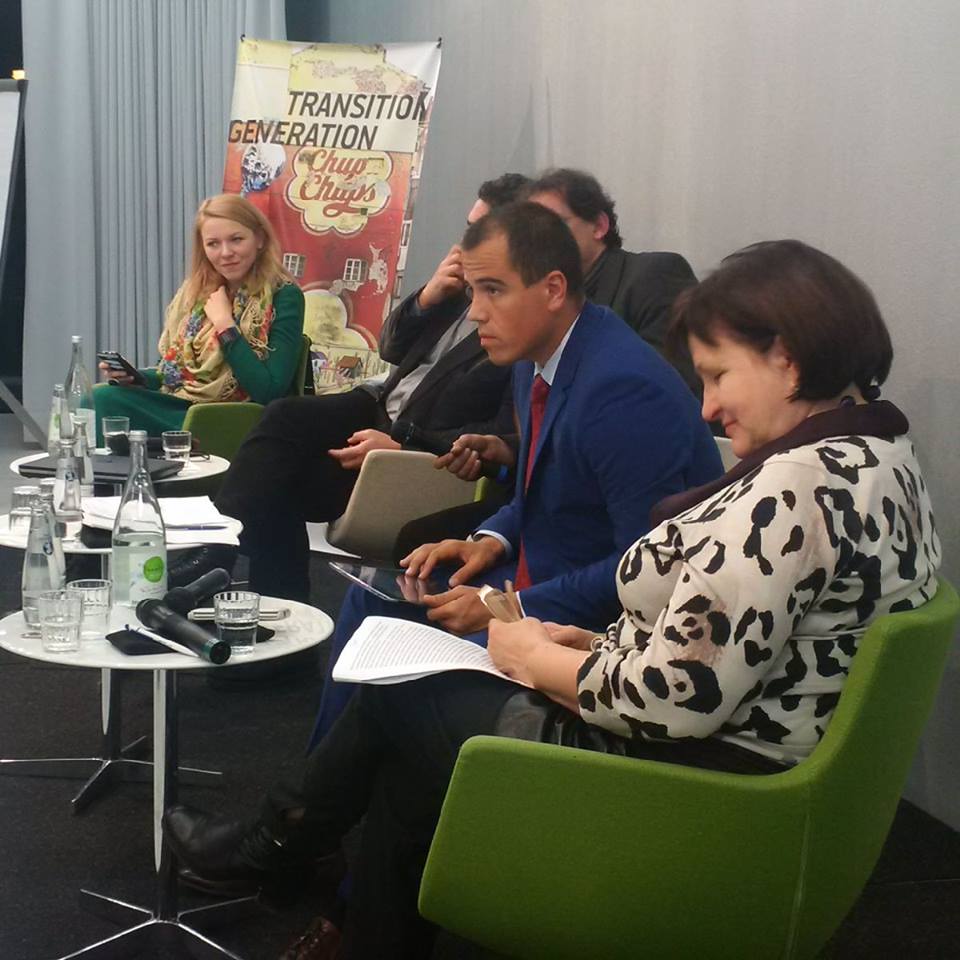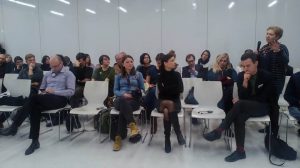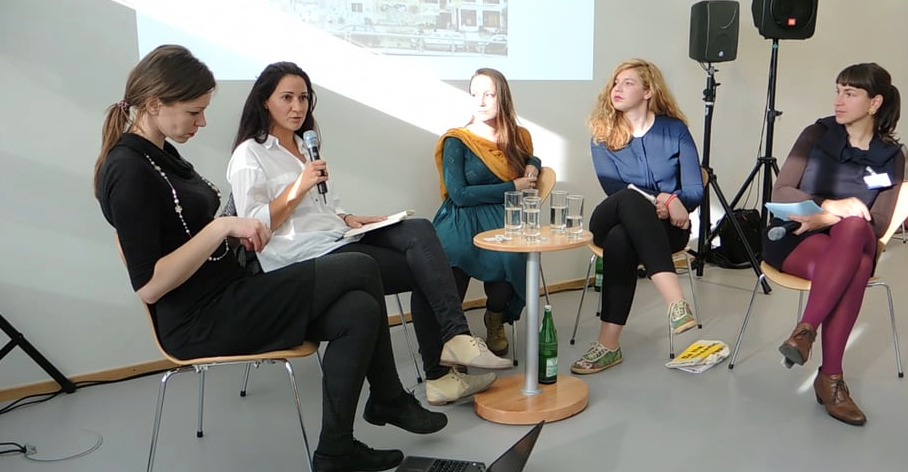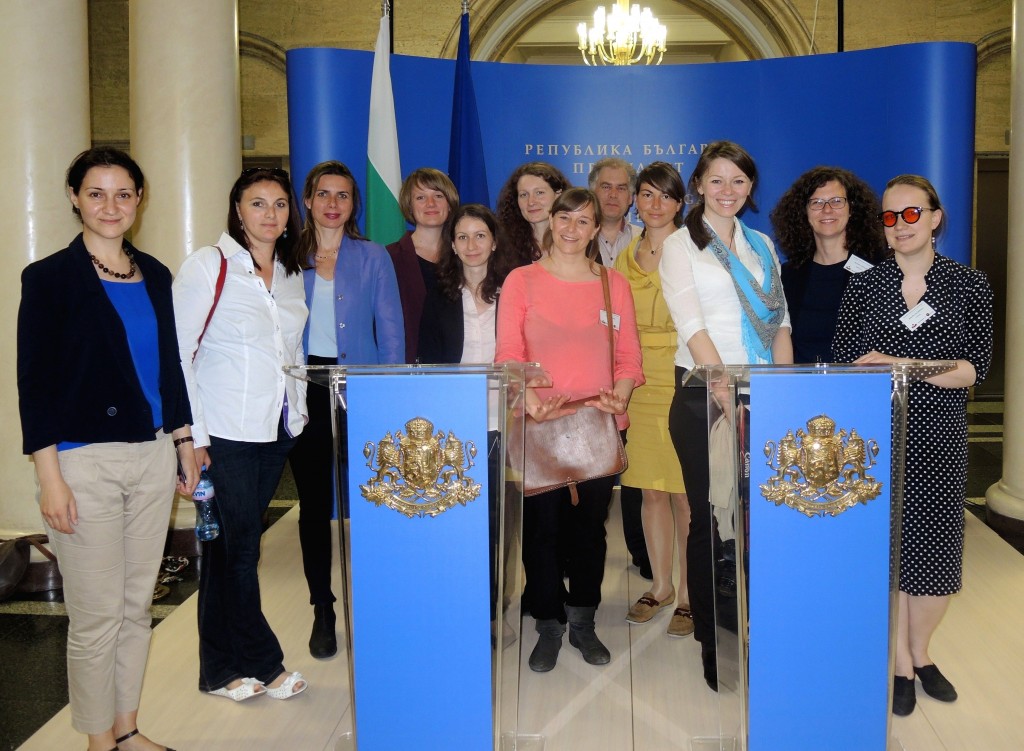Transition Dialogue Panel on the Conflict in Eastern Ukraine
9. November 2016 at Böll-Foundation Berlin, DRA Autumn Talks on Conflict Resolution in the Donbass Region
The war in Eastern Ukraine widely disappeared from from press coverage and international notice. But the conflict goes on and the Minsk peace process is shaky. After discussing prospects for conflict resolution for two days, this panel tried to shed some light on the issue of transition experience as a factor in the conflict in the Donbass.
Indeed, thesis and sides taken by the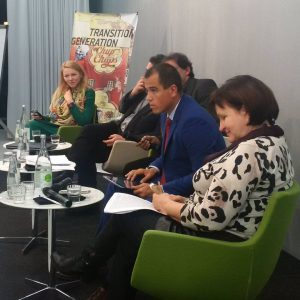 panellists and audience happened to present the conflict setting in a nutshell. A heated discussion revealed the long shadows of the past.
panellists and audience happened to present the conflict setting in a nutshell. A heated discussion revealed the long shadows of the past.
Igor Semivolos from the Crisis Media Center Kiev argued there was a certain mind set of Donbass people that triggered this conflict: Firstly, because the Soviet culture was mainly a culture of violence with its emphasis on the eternal struggle of communism against its enemies. Secondly, the Donbass was suffering from a cultural poverty. People there preserve the “paternalist attitude that someone will do it better for them”, say Semivolos. Individual identity was not welcome here, there was still a culture of collectivism. In this region, that is the ‘most Russian one’ of all Ukraine regions, there were social tensions before the conflict broke out.
Valentina Cherevatenko, Union of the Don Women, lives in a Russian region close to the Ukraine boarder. Here, it happens that one part of the village is Russian and one part is Ukraine.
We had a clear picture from films of who is the enemy, she remembers her childhood in the Soviet Union. The problem is, that certain “buzzwords” proof to be longlasting and are reframed and reused in the current conflict – without reflecting what we are actually talking about. “If you told me, what you understand with fascism, I can tell you, if we have it or not”, says Cherevatenko.
“Everything we experience today is related to the way that history is presented to us.” We must talk to each other, we must understand what we mean with the words we use. “Future needs remembrance and remembrance needs future.” Valentina Cherevatenko
The audience of about 50 people was eager to contribute to the discussion, as for instance Valentina from Ukraine remembered, “When I was in the first grade my belief was that I would live in Communism forever. But then the Soviet Union collapsed.” Especially for history teachers the situation was difficult: history was rewritten and changed, and now 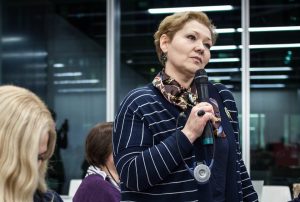 a completely different history was teached.
a completely different history was teached.
Then a competition of history startet with the election of Juschtschenko and goes on since then, she says. “In the region where I live, the situation after Maidan was not accepted, it was not just in the Donbass.” She remembered the summer of 2014 as a moment of breakdown of public infrastructure, that people could only manage because of mutual collective help organised by citizens.
Olena Pravylo from the Congress of Cultural Activists took a different stand: “As a person who was on the Maidan from the first day, I can say, that there are obviously different positions. But I don’t want to argue to about this.”
Instead she drew the attention on the research and interviews she did as part of the Transition Dialogue network. From the research, she understood that the different generations have a very different remembrance and perspective on history.
“My generation – in 1991 we were children. For us Tschernobyl meant vacation.” After the explosion, many people were moved to different regions to escape the radio-active pollution. “But the interviewed people born in the 70s and 60s said: We were born and went to school as Soviet Children. After the Soviet Union was just banditism. They say, the best time was only after 2000 when things finally stabilised”, she recalls from her research. Transition doesn’t end. “What we need is a transition generation dialogue, to discover how differently we understand history.”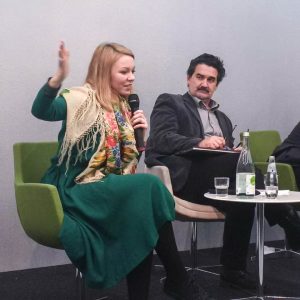
She referred to the resume from research done in Germany, suggesting a role swith between children (born in the 80s) and their parents. “The children understood new rules of the game. But the parents still live in the past, they did not manage to adjust to he changes and find their position.”
“The boarder of Soviet thinking is moving eastwards but it is still there”, says Olena Pravylo. “Through the Transition Dialogue network, I understand that there are many Russian people who want a dialogue, who want to question the patterns of thinking and overcome the conflict.”
“I am happy we have now changes in Ukraine after Maidan. Let’s see, were it leads. I liked the answer of a person I asked, how he would understand that transition ends: He said, ‘then clerks in public service will smile like normal people’.” Olena Pravylo
Aleksei Tokarev from MIGMO University switched the topic saying he wants to address the stereotypes. “I try to tear down this wall.” He said, he would not deny that Russian troops went to Ukraine twice. But “it’s the problem of Europe that they think, the problems lie only in Moscow.” He insisted the voice of people in the Donbass wasn’t heard. Far not everyone there would agree to the politics in Kiev.
Here the question, if the conflict in the Ukraine was a civil or international war was on the table again. “It has both elements”, says Igor Semyvolos. “It’s also a civil conflict.” After collapse of Soviet Union, people in the Donbass had not developed a new common identity like most people in Western Ukraine. As the conflict was triggered, they were in the midst, “forced to take side between Ukraine and Russia”.
Voices from the audience jumped back on the issue of transition: “The transition from communist time hasn’t finished, and that is the reason for this conflict”, one woman said. She quoted the artist Dragovic’s: ‘how to lead into conflict in three easy steps’: First; raise level of acceptance for violence in society – e.g. activists were confronted in a cruel way, that was to serve this purpose. Second, create stereotypes – first victim of war is truth.
Another women said, “we grew up having been teached, that Ukraine identity would not exist if it wasn’t defended with blood. It’s a culture of self-defence. But it is not one of tolerance. So you in Germany do not understand: How could you support a war? But that is why.”
“We need to ask ourselves who we are? We are children of Soviet union and live now 20 years without identification.” Statement from the audience
The discussion showed that issues of identity arising of the break up of Soviet Union and ongoing instability indeed contribute to the conflict setting in the Donbass. Mental lines of conflict run deep through the population within the Ukraine and and beyond, they are not only between regions but also generations.
Actually, narratives of the past long before the break up of the Soviet Union are framing and impacting on the attitude to the Ukraine state and the Donbass conflict now. Also in this discussion participants called on historical events and actors – like the 2. World War – to make their point. As stressed by panelists and audience, it would need a lot more dialogue to sharpen the senses for the fact that there are different perspectives on history and the current conflict in the Donbass. Indeed, when people find it hard to talk to each other, is is probably the clearest sign that they should talk.

